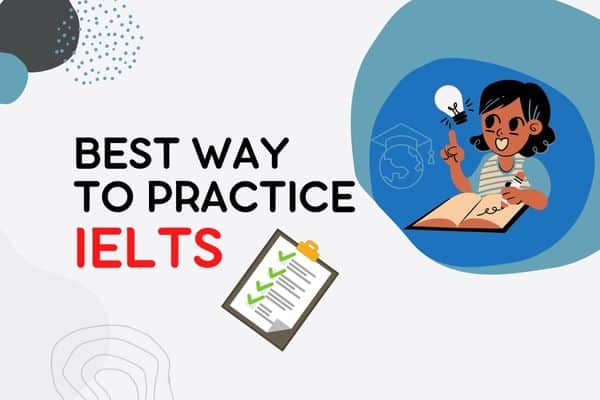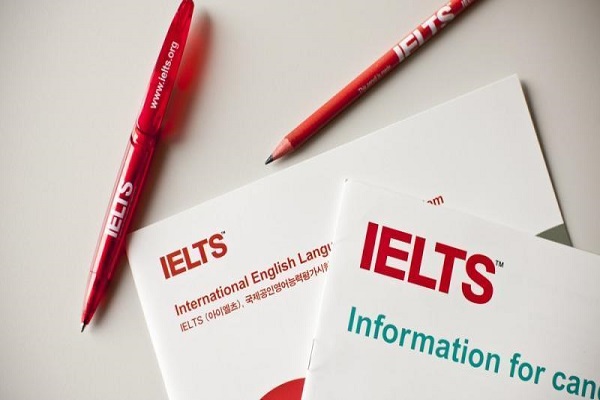The best way to Practice IELTS

There are a few key ways to practice for the IELTS (International English Language Testing System) exam:
Use official practice materials: The IELTS website offers a range of official practice materials, including sample questions, listening and reading passages, and sample answers, which can help you get a feel for the types of questions you will encounter on the exam.
Take a practice test: You can find a range of practice tests online, including some that are free. Taking a practice test can help you get a sense of the timing and pacing of the exam, as well as give you an idea of your current level of proficiency.
Seek feedback on your writing and speaking: To improve your writing and speaking skills, it can be helpful to get feedback from a teacher or tutor who is familiar with the IELTS exam. This can help you identify areas where you need to improve and give you specific strategies for doing so.
Focus on improving your language skills: The IELTS exam tests your ability to communicate in English in a range of contexts, so it’s important to focus on improving your overall language skills. This can include practicing reading, writing, listening, and speaking in English, as well as learning new vocabulary and grammar.
Get plenty of rest and stay calm: It’s important to be well-rested and relaxed on the day of the exam, as this can help you perform at your best. Make sure to get a good night’s sleep before the exam, and try to relax and stay calm during the exam.
Here are a few additional ways you can practice for the IELTS exam:
Take an IELTS preparation course: Many schools and language centers offer courses specifically designed to help students prepare for the IELTS exam. These courses can provide structured practice and feedback, as well as tips and strategies for doing well on the exam.
Practice with sample questions: There are many websites and resources that offer sample IELTS questions and practice tests. Working through these can help you get a feel for the types of questions you will encounter on the exam and can help you identify areas where you need to improve.
Review the IELTS scoring criteria: It’s important to understand how the IELTS exam is scored, so you can focus on the areas that are most important. The exam is scored on a scale of 0-9, with higher scores indicating a higher level of proficiency. You can find more information on the scoring criteria on the IELTS website.
Focus on improving your language skills: As mentioned earlier, the IELTS exam tests your ability to communicate in English in a range of contexts. To do well on the exam, it’s important to focus on improving your overall language skills, including your vocabulary, grammar, and pronunciation.
Get plenty of rest and stay calm: It’s important to be well-rested and relaxed on the day of the exam, as this can help you perform at your best. Make sure to get a good night’s sleep before the exam, and try to relax and stay calm during the exam. This can help you think more clearly and do your best on the exam.
Here are a few more tips for practicing for the IELTS exam:
Set aside regular study time: To effectively prepare for the IELTS exam, it’s important to set aside regular study time. This can help you stay focused and make progress toward your goals. You can also try to create a study schedule that breaks down your practice sessions into smaller, more manageable chunks of time.
Use a variety of resources: To get a well-rounded practice experience, it’s helpful to use a variety of resources. This can include official IELTS practice materials, sample questions from other sources, and practice tests. You can also try listening to English-language podcasts or watching TV shows or movies in English to get more listening practice.
Find a study partner or tutor: Working with a study partner or tutor can be a helpful way to stay motivated and get feedback on your progress. A study partner can also help you practice speaking and listening skills.
Review your mistakes: When you practice, it’s important to pay attention to the areas where you struggle. Reviewing your mistakes can help you understand what you need to work on and give you an opportunity to correct any misunderstandings.
Don’t be afraid to ask for help: If you’re having trouble with a particular aspect of the IELTS exam, don’t be afraid to ask for help. You can find a tutor or teacher who can provide guidance and feedback, or you can seek out additional resources to help you improve.
Here are a few more specific tips for practicing for the IELTS exam:
Practice with authentic materials: To get a sense of the types of tasks you’ll encounter on the IELTS exam, it’s helpful to practice with authentic materials. This can include sample questions from the IELTS website, as well as real news articles, podcasts, and other authentic English-language materials.
Focus on the skills being tested: The IELTS exam tests four main skills: reading, writing, listening, and speaking. Make sure to practice each of these skills separately, and focus on the specific tasks and criteria that are being tested in each skill.
Use the right resources: There are many resources available to help you practice for the IELTS exam. Make sure to use resources that are appropriate for your level and that align with the format and content of the exam.
Get feedback: To improve your skills, it’s important to get feedback on your progress. This can include getting feedback from a tutor or teacher, as well as reviewing sample answers and the IELTS scoring criteria to understand what is expected.
Practice timing: The IELTS exam has strict time limits for each section, so it’s important to practice working within these limits. Try taking practice tests under timed conditions to get a sense of the pacing of the exam.
Understand the test format: Familiarizing yourself with the format of the IELTS exam can help you feel more prepared and confident on test day. The exam consists of four sections: Listening, Reading, Writing, and Speaking. Each section tests a different skill, and the questions and tasks vary depending on the section. Make sure to review the format and content of each section so you know what to expect.
Practice with sample questions: There are many websites and resources that offer sample IELTS questions and practice tests. Working through these can help you get a feel for the types of questions you will encounter on the exam and can help you identify areas where you need to improve.
Review the scoring criteria: It’s important to understand how the IELTS exam is scored, so you can focus on the areas that are most important. The exam is scored on a scale of 0-9, with higher scores indicating a higher level of proficiency. You can find more information on the scoring criteria on the IELTS website.
Pay attention to the time limits: The IELTS exam has strict time limits for each section, so it’s important to practice working within these limits. Try taking practice tests under timed conditions to get a sense of the pacing of the exam.
Get feedback: To improve your skills, it’s important to get feedback on your progress. This can include getting feedback from a tutor or teacher, as well as reviewing sample answers and the IELTS scoring criteria to understand what is expected.
The International English Language Testing System (IELTS) is an English language proficiency test that is used by universities, employers, and immigration authorities around the world to assess the language skills of non-native English speakers. It is administered by the British Council, IDP: IELTS Australia, and the University of Cambridge English Language Assessment.
The IELTS exam consists of four sections: Listening, Reading, Writing, and Speaking. Each section tests a different skill and is designed to assess your ability to use English in a range of contexts.
Listening: In the Listening section, you will listen to recordings of conversations, lectures, and other spoken materials, and answer questions based on what you hear.
Reading: In the Reading section, you will read a variety of texts and answer questions based on what you read. The texts may be taken from newspapers, magazines, books, or other sources, and may include fiction, non-fiction, and academic texts.
Writing: In the Writing section, you will write two essays in response to prompts. The first essay is a short piece of writing that you will complete in 20 minutes, and the second essay is a longer piece of writing that you will complete in 40 minutes.
Speaking: In the Speaking section, you will have a face-to-face interview with an IELTS examiner. During the interview, you will be asked a range of questions about yourself and your opinions, and you will be expected to talk about a given topic.
The IELTS exam is scored on a scale of 0-9, with higher scores indicating a higher level of proficiency. The scores are based on a combination of your performance on the Listening, Reading, Writing, and Speaking sections of the exam.
To know more leave a comment here or on our Facebook Page.




